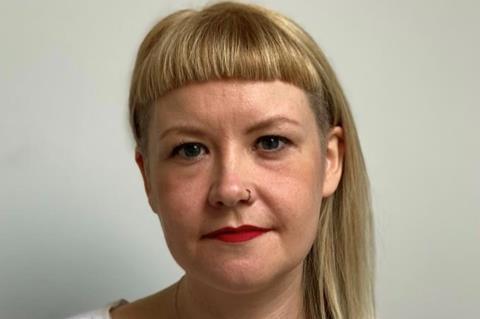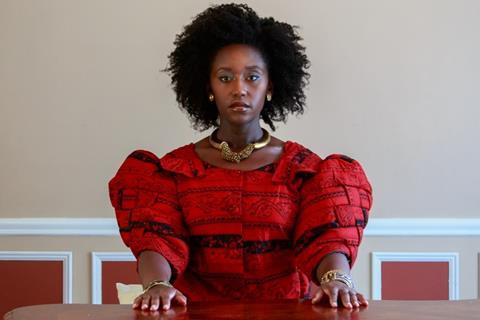
“It’s a long game, undoing what we all expect to watch on the big screen,” says Melanie Iredale, director of UK gender equality group Birds’ Eye View (BEV), the organisation that campaigns to support the perspectives of women and non-binary people in all film spaces, and to combat systematic oppression in the industry for marginalised groups.
The Yorkshire-born and Sheffield-based former deputy director at Sheffield Doc Fest took up the position in September after director-at-large Mia Bays departed to become director of the British Film Institute (BFI) Film Fund.
Iredale has taken up the mantle during a tense period for the industry, faced with various waves of Covid uncertainty, the looming threat of the cost of living crisis on cinema attendance and some sobering data on the number of films made by women and released in the UK.
According to data collected by BEV, in 2021, 166 films made by women (director, co-director, and/or writer or co-writer with at least 50% female credit) were released (theatrically and on online platforms in response to pandemic lockdowns) in the UK, accounting for 30% of all UK film releases that year. This was a 1% increase from 2020.
In the first three months of 2022, the percentage of films made by women and released theatrically in the UK stood at 22% – 8% lower than in 2021. This is possibly owing to the Covid-induced backlog of US studio films released at the start of the year, that tend to be skewed towards being created by men. “Maybe it’s not something to be alarmed by. Let’s wait and see if the figure levels out,” notes Iredale.
The data is rather more concerning for non-white female filmmakers – 22 non-white female directors out of a total of 118 female directed or co-directed films were released in the UK in 2021, or 19%. This is far lower than 33% in 2020, and is just 2% higher than the 2017 level (17%).
In short, there’s plenty of work for BEV to do. Iredale identifies that it’s “across the board” in the industry that change need to be happen – and she’s started by reflecting on her own organisation.
“To be best placed to continue to advocate for safe, fair, non-hierarchical, non-patriarchal, non-colonised working practices, all organisations need to start by looking inwards and holding a mirror to itself and undergoing a period of intense reflection,” says Iredale. “That’s not to say the [BEV] house wasn’t in order, but it was important for me to start from the beginning, so I can be part of that process and that way of working.
“It has been about building on work that has already been done and led by the values we set out as an organisation. We want to create space where everyone is free to raise their hand and say, ‘This doesn’t feel right’ on any one decision. Our values come down to vulnerability, compassion, care, openness and showing up.
“I’m feeling the effects of an organisation that’s really been developed to challenge patriarchy,” she adds. “There’s something about the way in which we work that is very compassionate.”
The BEV board of trustees no longer has a chair, with members taking it in turn to facilitate meetings, on a 10-week cycle. A recent new hire is Isra Al Kassi as BEV’s head of programmes and audience development. Al Kassi is co-founder of T A P E Collective, a grassroots movement that works to programme film-based events as a response to a lack of representation on screen. “I’m really interested in what organisations like ours – yes we’re small but we’re also BFI funded, we’re part of the industry – can be learning from collectives. If I’m thinking about how we create safe spaces, I’m looking at what collectives like T A P E are doing. In terms of festivals, I’m looking at SQIFF [Scottish LGBTQ+ festival], rather than the bigger mainstream festivals.”
Five impact producers have also been hired, based across the UK, to represent BEV’s community-building Reclaim The Frame initiative, and bolster the organisation’s commitment to decentralising. An additional impact producer is currently being sought in Cardiff.
Global allies
BEV has branched out internationally, through its Reclaim The Frame x International project, supported by the British Council and launched this year to chime with International Women’s Day.
A programme of films has been curated with international women’s film festivals, which is being circulated around the partnering festivals: Beirut International Women Film Festival (Lebanon), Flying Broom Foundation (Turkey), Regards de Femmes: Festival International de Film de Femmes (Tunisia) and Women Make Waves International Film Festival (Taiwan). Nazlı Elif Durlu’s Zuhal, Zeina Daccache’s The Blue Inmates, Leyla Bouzid’s A Tale Of Love And Desire and Celeste Bell and Paul Sng’s Poly Styrene: I Am A Cliché are the titles currently taking part.
The Filmonomics business training programme for filmmakers from marginalised genders – in its sixth iteration in the UK – is also now expanding, with a free online programme being made available to filmmakers from or based in Lebanon, Turkey, Tunisia and Taiwan, to launch on August 24 and run until International Women’s Day 2023 (March 8). Iredale notes the projects are about working “reciprocally” with international partners. “I’m interested in importing culture, as much as exporting,” she says.
Looking ahead
Iredale is keen to continue to diversify the BEV slate: “I’m really interested in how we continue to push boundaries in terms of form and geography. I’m committed to showing more work where we can from the Global South and parts of the world we see less on screen, and to explore opportunities to work with films that haven’t got distribution yet.”

July sees BEV’s freshly curated Queerious programme being taken to cinemas across the UK – a mixture of retrospectives and previews of new work that looks at queer love through a feminist lens, including Sally Potter’s The Gold Diggers and Deepa Mehta’s Fire. In August, Reclaim The Frame will also be supporting the release of Nana Mensah’s Tribeca premiere Queen Of Glory, alongside Bohemia Media, about a Ghanaian-American woman who decides to abandon her Ivy League doctoral programme in New York to follow her married lover to Ohio, only for tragedy to scupper her plans.
There’s also the question of what the review of the BFI’s National Lottery funding strategy for the next 10 years might mean for the organisation’s future. BEV currently receives less than half of its funding from the BFI, with the rest made up through its own fundraising.
“We’ve fed into the consultation and in the feedback from the first round of consultations, the number one concern or priority for both public and industry stakeholders who took part in that conversation was about diversity,” says Iredale. “That’s huge. Obviously, how the BFI responds to that, and how we all respond to that, is key. It’s not enough that it’s a concern.”






![The Brightest SunScreen[Courtesy HKIFF]](https://d1nslcd7m2225b.cloudfront.net/Pictures/274x183/3/5/0/1448350_thebrightestsunscreencourtesyhkiff_312678.jpg)


















No comments yet